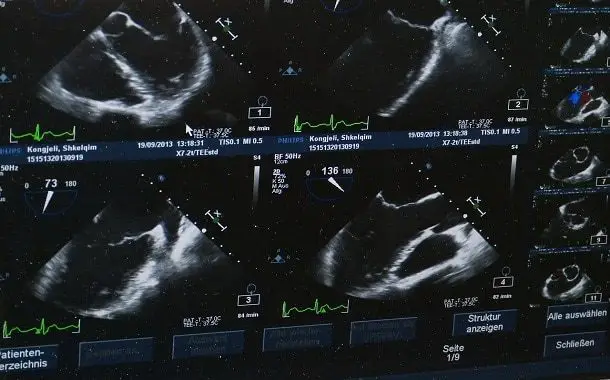How Much Does Ultrasound Technician School Cost?
Last Updated on February 4, 2024
Written by CPA Alec Pow | Content Reviewed by ![]() CFA Alexander Popinker
CFA Alexander Popinker
The cost of becoming an ultrasound technician varies depending on the type of degree, school, and program. However, ultrasound technician salaries make the investment well worth it. This guide breaks down tuition, fees, financial aid, and more to help you make an informed decision.
Pursuing a career as an ultrasound technician offers great job placement and salary potential. However, the initial school costs can be daunting. Tuition and fees for ultrasound technician certification programs, associate degrees, and bachelor’s degrees range widely.
Understanding the full scope of expenses for accredited institutions lets you maximize your return on investment. With prudent planning and wise use of scholarships and financial aid, ultrasound technician school is an accessible path to a rewarding healthcare career.
How Much Does Ultrasound Technician School Cost?
Tuition fees differ based on whether you pursue a certificate, associate degree, or bachelor’s degree in diagnostic medical sonography.
Certificate programs provide basic training in as little as one year. Expect tuition around $2,000 to $5,000.
Associate degrees take two years and offer more advanced coursework. Tuition runs $5,000 to $10,000 per year.
Bachelor’s degrees build on that training over four years, costing $10,000 to $30,000 annually.
Some schools also charge additional fees for equipment, labs, and more. Clinical training may also involve out-of-pocket costs.
According to College Tuition Compare, for example, the average vocational program’s tuition for Diagnostic Medical Sonography/Sonographer and Ultrasound Technician is $39,619.
Institute of Ultrasound Diagnostics offers a one-year program tuition priced at $12,500, with additional fees for lab, technology, books, and materials.
Affordable Colleges Online writes that AdventHealth University offers an online Bachelor of Science in Imaging Sciences for Ultrasound Tech at a cost of $18,900. Fort Hays State University offers a program at a cost of $4,140.
As these are third party prices, they are subject to change, so always contact the school representatives for exact degree program costs.
Community Colleges and Vocational Schools Are Most Affordable
Community colleges and vocational schools offer the most budget-friendly path to becoming an ultrasound technician.
Tuition and fees for an associate degree at a community college typically run $5,000 to $7,500 per year. Schools like Mesa Community College in Arizona charge around $2,500 annually for in-state tuition.
Vocational programs like those at Concorde Career College in California often range from $15,000 to $20,000 for the entire certificate.
Technical schools like Lincoln College of Technology in New Jersey offer comparable certificate costs under $22,000.
Universities Carry Higher Tuition Prices and Fees
Bachelor’s degrees from four-year colleges provide the most comprehensive training but at higher tuition rates.
In-state tuition for a BS at public universities like the University of North Carolina runs $12,000 to $15,000 annually.
Private colleges like Drexel in Pennsylvania charge $50,000+ per year.
Intensive ultrasound programs like Thomas Jefferson University’s can cost over $100,000 for the full four-year degree.
Online Programs Offer Convenience and Flexibility
Online courses allow students to save on transportation and housing costs. However, tuition rates are often comparable to on-campus programs.
The University of Arkansas‘ online BS in Diagnostic Medical Sonography costs the same $8,300 per year for in-state residents as its on-campus counterpart.
Still, the convenience of distance learning may provide access to those unable to attend traditional classes full-time. Programs like Stephens College’s fully online sonography track balances accessibility and quality.
Additional Expenses Add Up
Beyond tuition, students face costs for textbooks, equipment, exam fees, and more.
- Textbooks and reference books can cost $500 to $1,000. Digital materials help offset this expense.
- Ultrasound equipment for training costs $3,000 to $6,000. Renting used gear reduces costs.
- ARDMS certification exams run $250 each. Licensing fees also apply in some states.
- Clinical training may require housing if not local. Expect $500 to $1,000 in travel and lodging expenses.
Careful budgeting and cost-saving strategies can help minimize these secondary expenses.
Financial Aid Eases the Burden
 With proper planning, financial aid can cover much of the costs associated with ultrasound technician school.
With proper planning, financial aid can cover much of the costs associated with ultrasound technician school.
- Federal loans and grants like the Pell Grant provide aid to qualifying students.
- State funding, like California’s Cal Grant, delivers assistance to resident students.
- Many schools offer institutional aid and scholarships to ultrasound students with academic merit or financial hardship. External groups also provide sonography scholarships.
- Employer tuition reimbursement programs help cover school costs for current healthcare professionals seeking to advance their education.
- GI Bill benefits give qualifying veterans and family members education funding for ultrasound tech programs.
Earning Potential Justifies Investment
With median earnings over $70,000 a year, the salary potential justifies the investment in ultrasound technician education.
Other factors also improve the return on your tuition dollars:
- High job placement rates above 90% means graduates readily find employment.
- Career advancement provides opportunities to move into management roles, teaching, or specialized fields within sonography.
- Accredited programs ensure your degree carries weight with employers.
Overall, prudent financial planning and wise use of funding opportunities make ultrasound technician certification highly accessible. The modest upfront investment pays dividends through years of meaningful, well-compensated employment.
Check out our articles about the cost of radiology technician school, esthetician school, and chiropractor school.
Making an Informed Decision on Sonography Technician School
Choosing the right program requires balancing cost, quality, and career objectives. Your specific needs determine the ideal path.
For a fast, affordable route to entry-level work, certificate programs and community college degrees offer great value. Those seeking leadership roles and specialty fields benefit from advanced bachelor’s degrees despite the higher costs.
No matter your chosen program, enroll in an accredited institution to ensure your education meets high standards. Also confirm clinical placement opportunities to gain essential hands-on experience.
With smart planning and resource utilization, the initial outlay proves minor compared to long-term gains. Allow thorough research and career aspirations to guide your ultrasound technician education decisions.
Frequently Asked Questions
What school is best for ultrasound technicians?
The “best” ultrasound technician school depends on your career goals, location, and budget. Top picks include Thomas Jefferson University for its high exam pass rate and specialized tracks.
The Mayo Clinic School of Health Sciences offers a robust clinical experience through the Mayo Clinic system. Santa Barbara City College provides an affordable path to certification on the West Coast.
Go over factors like accreditation, hands-on training, exam preparation, and cost to choose the optimal school for your needs.
Where do ultrasound techs make the most money?
Ultrasound techs earn the highest salaries in California, Alaska, Massachusetts, Washington, and Oregon. Salaries in these states range from $85,000 to $99,000 due to strong job demand and high costs of living.
Major metropolitan areas also offer pay above the national median. With the right credentials, experience, and specialization, six-figure salaries are attainable in top-paying ultrasound tech jobs nationwide.
What is the shortest ultrasound tech program?
The shortest path to becoming an ultrasound tech is a one-year certificate program. These are commonly offered at vocational schools, technical colleges, and community colleges.
Students take condensed coursework in ultrasound physics, anatomy, scanning protocols, and image analysis. Hands-on clinical training prepares students for entry-level sonographer jobs.
With diligent study, certificates provide basic sonography skills in just 9-18 months. For the fastest route to this growing field, one-year certificates are optimal.


Leave a Reply
Want to join the discussion?Feel free to contribute!